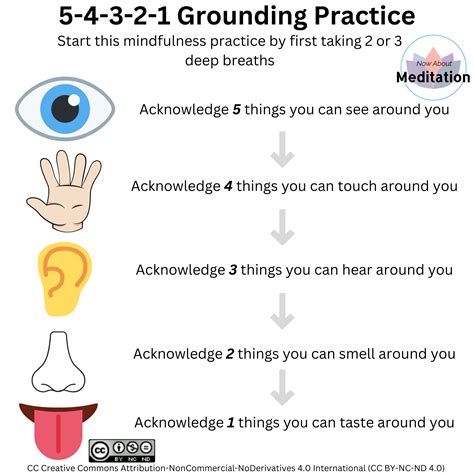Intro
Discover mindfulness meditation benefits, reducing stress and anxiety through mindfulness techniques, increasing self-awareness and mental clarity with regular practice and meditation exercises.
The concept of mindfulness meditation has been around for centuries, originating from ancient Eastern spiritual practices. In recent years, it has gained significant attention in the Western world for its potential to improve mental and physical well-being. As people become more aware of the importance of self-care and stress management, mindfulness meditation has become a popular tool for achieving a healthier and happier life. With its roots in Buddhism and yoga, mindfulness meditation has evolved to become a secular practice that can be enjoyed by anyone, regardless of their cultural or religious background. The benefits of mindfulness meditation are numerous, and research has shown that regular practice can lead to significant improvements in both physical and mental health.
Mindfulness meditation is a powerful technique that involves paying attention to the present moment, often through focus on the breath or body sensations. By cultivating awareness of the present, individuals can develop a greater understanding of themselves and the world around them. This increased awareness can lead to a range of benefits, including reduced stress and anxiety, improved sleep quality, and enhanced cognitive function. Moreover, mindfulness meditation has been shown to have a positive impact on emotional regulation, allowing individuals to better manage their emotions and respond to challenging situations in a more mindful and compassionate way.
As the world becomes increasingly fast-paced and demanding, the need for effective stress management techniques has never been more pressing. Mindfulness meditation offers a simple yet powerful tool for managing stress and promoting relaxation. By taking just a few minutes each day to focus on the breath and cultivate awareness of the present moment, individuals can experience a significant reduction in stress and anxiety. This, in turn, can have a positive impact on overall health and well-being, leading to improved relationships, increased productivity, and a greater sense of purpose and fulfillment. With its numerous benefits and ease of practice, it's no wonder that mindfulness meditation has become a popular technique for achieving a healthier and happier life.
Mindfulness Meditation Benefits for Mental Health

Mindfulness meditation has been shown to have a positive impact on mental health, reducing symptoms of anxiety and depression, and improving emotional regulation. By cultivating awareness of the present moment, individuals can develop a greater understanding of their thoughts, emotions, and behaviors, allowing them to better manage their mental health. Regular practice has also been shown to reduce stress and anxiety, leading to improved sleep quality, increased feelings of relaxation, and enhanced overall well-being. Furthermore, mindfulness meditation has been found to increase gray matter in areas of the brain associated with attention, emotion regulation, and memory, leading to improved cognitive function and a reduced risk of age-related cognitive decline.
Some of the key benefits of mindfulness meditation for mental health include:
- Reduced symptoms of anxiety and depression
- Improved emotional regulation
- Enhanced cognitive function
- Increased feelings of relaxation and calm
- Improved sleep quality
- Increased gray matter in areas of the brain associated with attention, emotion regulation, and memory
How Mindfulness Meditation Affects the Brain
Mindfulness meditation has been shown to have a positive impact on brain function and structure, leading to improved cognitive function and a reduced risk of age-related cognitive decline. Regular practice has been found to increase gray matter in areas of the brain associated with attention, emotion regulation, and memory, while also reducing inflammation and promoting neural plasticity. This can lead to improved attention, memory, and emotional regulation, as well as a reduced risk of neurodegenerative diseases such as Alzheimer's and Parkinson's.Mindfulness Meditation Benefits for Physical Health

In addition to its benefits for mental health, mindfulness meditation has also been shown to have a positive impact on physical health. Regular practice has been found to reduce chronic pain, improve sleep quality, and boost the immune system, leading to improved overall health and well-being. Mindfulness meditation has also been found to reduce inflammation, which is associated with a range of chronic diseases, including heart disease, diabetes, and cancer. Furthermore, regular practice has been shown to lower blood pressure, reduce symptoms of irritable bowel syndrome, and improve overall physical function.
Some of the key benefits of mindfulness meditation for physical health include:
- Reduced chronic pain
- Improved sleep quality
- Boosted immune system
- Reduced inflammation
- Lower blood pressure
- Reduced symptoms of irritable bowel syndrome
- Improved overall physical function
The Science Behind Mindfulness Meditation
The science behind mindfulness meditation is complex and multifaceted, involving a range of physiological and psychological mechanisms. Regular practice has been shown to activate the parasympathetic nervous system, leading to a state of relaxation and reduced stress. Mindfulness meditation has also been found to increase the production of neurotransmitters such as serotonin and dopamine, which are associated with improved mood and emotional regulation. Furthermore, regular practice has been shown to reduce cortisol levels, leading to improved sleep quality and reduced inflammation.Getting Started with Mindfulness Meditation

Getting started with mindfulness meditation is simple and straightforward. Begin by finding a quiet and comfortable place to sit or lie down, close your eyes, and focus on your breath. When your mind wanders, gently bring your attention back to the breath without judgment or distraction. Start with short periods of practice, such as 5-10 minutes, and gradually increase as you become more comfortable with the technique. You can also use guided meditations or apps to help you get started and stay on track.
Some tips for getting started with mindfulness meditation include:
- Find a quiet and comfortable place to practice
- Start with short periods of practice and gradually increase
- Focus on the breath and gently bring your attention back when your mind wanders
- Use guided meditations or apps to help you get started
- Be patient and consistent with your practice
Common Challenges and Solutions
Common challenges when starting a mindfulness meditation practice include difficulty quieting the mind, physical discomfort, and lack of motivation. To overcome these challenges, try to be patient and consistent with your practice, and remember that it's okay if your mind wanders. You can also try different techniques, such as focusing on the body or using guided meditations, to help you stay on track. Additionally, finding a quiet and comfortable place to practice, and establishing a regular routine, can help you stay motivated and committed to your practice.Mindfulness Meditation in Daily Life

Mindfulness meditation is not just a technique for reducing stress and improving mental health, but also a way of living. By cultivating awareness of the present moment, individuals can develop a greater appreciation for life and a greater sense of purpose and fulfillment. Mindfulness meditation can be incorporated into daily activities, such as eating, walking, or showering, by paying attention to the sensations and experiences of the present moment. This can lead to a greater sense of joy, gratitude, and wonder, and a more meaningful and fulfilling life.
Some ways to incorporate mindfulness meditation into daily life include:
- Paying attention to the sensations and experiences of the present moment
- Practicing mindfulness during daily activities, such as eating or walking
- Using mindfulness to improve relationships and communication
- Incorporating mindfulness into work and daily tasks
- Using mindfulness to reduce stress and improve overall well-being
The Future of Mindfulness Meditation
The future of mindfulness meditation is exciting and promising, with a growing body of research and a increasing interest in the technique. As more people discover the benefits of mindfulness meditation, it is likely to become a more mainstream practice, incorporated into schools, workplaces, and healthcare systems. Additionally, the development of new technologies and apps is likely to make mindfulness meditation more accessible and convenient, allowing more people to experience the benefits of the technique.What is mindfulness meditation?
+Mindfulness meditation is a technique that involves paying attention to the present moment, often through focus on the breath or body sensations.
What are the benefits of mindfulness meditation?
+The benefits of mindfulness meditation include reduced stress and anxiety, improved sleep quality, and enhanced cognitive function, as well as improved emotional regulation and overall well-being.
How do I get started with mindfulness meditation?
+To get started with mindfulness meditation, find a quiet and comfortable place to sit or lie down, close your eyes, and focus on your breath. Start with short periods of practice and gradually increase as you become more comfortable with the technique.
In conclusion, mindfulness meditation is a powerful technique that offers a range of benefits for mental and physical health. By cultivating awareness of the present moment, individuals can develop a greater understanding of themselves and the world around them, leading to improved relationships, increased productivity, and a greater sense of purpose and fulfillment. Whether you're looking to reduce stress and anxiety, improve sleep quality, or simply feel more grounded and centered, mindfulness meditation is a technique that's worth exploring. So why not give it a try? Take a few minutes each day to focus on your breath, and see the positive impact it can have on your life. We invite you to share your experiences and thoughts on mindfulness meditation in the comments below, and to spread the word about the benefits of this powerful technique.
